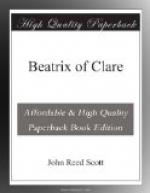“I quit it but this morning.”
“In sooth!” said the Abbot, with sudden interest. “And is His Grace of Gloucester still in presence there?”
“He left shortly before I did.”
“For London?”
“Nay, methinks I heard he rode to York,” replied De Lacy, who had learned enough on the Continent of the ways of churchmen not to tell them all he knew.
“To York!” said the Abbot in some surprise. “How many men did he take with him?”
“I was not present when the Duke departed and I did not see his following,” returned Aymer.
The Abbot’s keen eyes tried to read behind the answer, but evidently without success, for his next remark was: “I do not recall your face, Sir Aymer, among the many Knights who have traversed these parts.”
“Your memory is entirely trustworthy,” said De Lacy. “I came from France but lately, and have never seen this section until to-day.”
“Fare you not to the coronation?”
“In truth, yes, your reverence; Deo volente.”
“Then must you soon turn bridle; London lies to the South, my son,” said the Abbot, with a smile.
De Lacy laughed. “Never fear—I shall be there—Deo volente.”
“You have learned the Christian virtue of humility, at all events,” said the priest, as they entered the hall, where the monks were already seated around the long tables, awaiting the coming of the Abbot. Upon his appearance they all arose and remained standing while the Chancellor droned a Latin blessing. Then he took his carved chair at the smaller table on the dais, with the Knight beside him, and the repast began. During the meal, the Abbot made no effort to obtain his guest’s destination or mission, but discussed matters of general import. He, himself, contrary to the usual habits of the monks of his day, ate but little, and when De Lacy had finished he withdrew with him.
“You are anxious to be on your way,” he said, “and I will not detain you. These roads are scarce pleasant after night-fall.”
In the courtyard the men-at-arms were drawn up awaiting the order to mount.
“Verily, you ride well attended, my son. The roads need not bother you,” said the Abbot, as he ran his eyes over the array. . . “Methinks I have seen your face before,” looking hard at Raynor Royk.
“Like as not, your reverence,” said the old retainer calmly; “I am no stranger in Yorkshire.”
At that moment Dauvrey led the Knight’s horse forward, and Aymer turned to the monk before he could address another question to Raynor.
“I am much beholden, my lord Abbot, for your kindly entertainment and I hope some day I may requite it. Farewell.”
“Farewell, my son,” returned the monk. “May the peace of the Holy Benedict rest upon you.”
He watched them until the last horseman had clattered through the gateway, then turned away.
“My mitre on it, they are Gloucester’s men,” he muttered.




